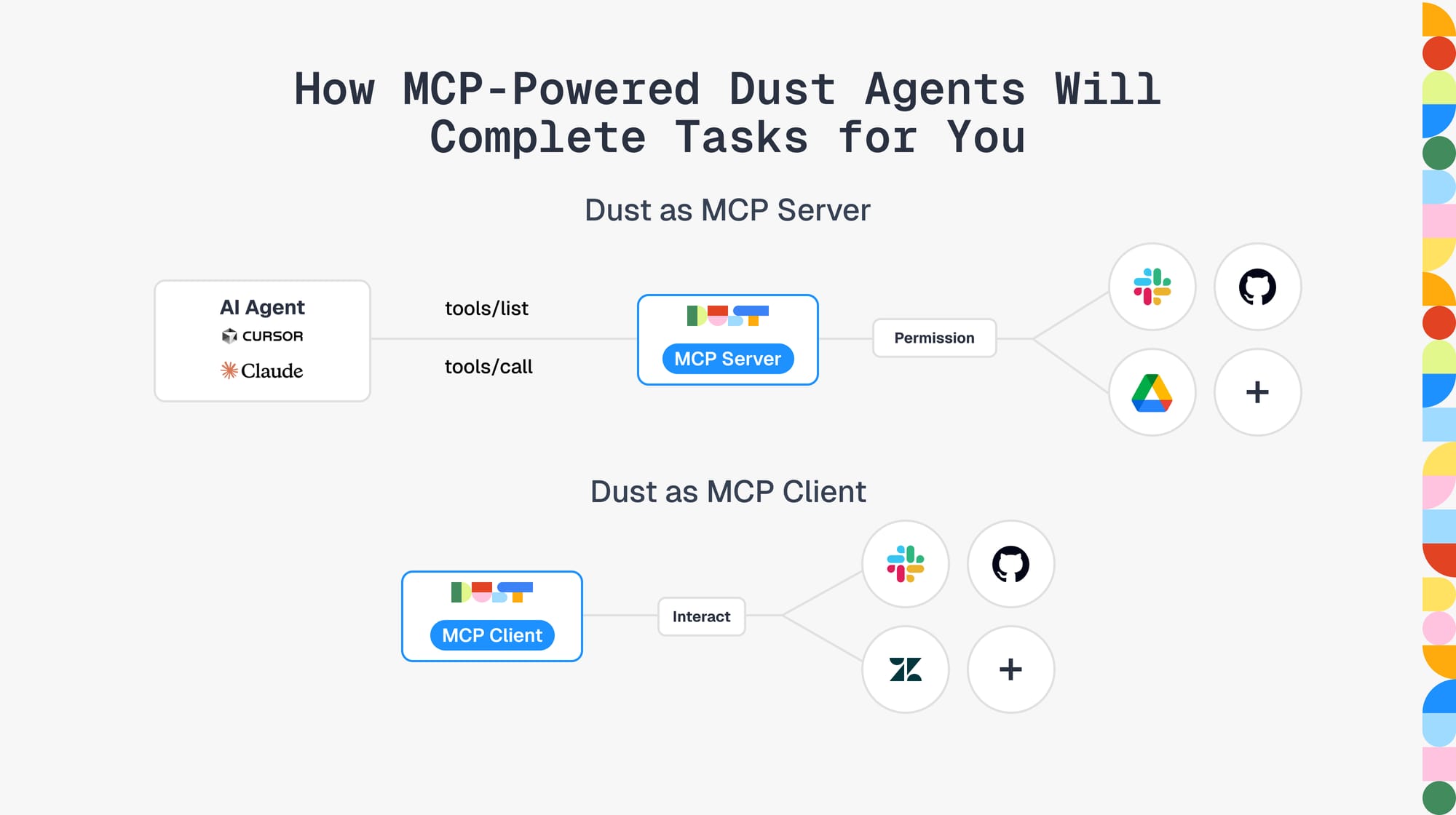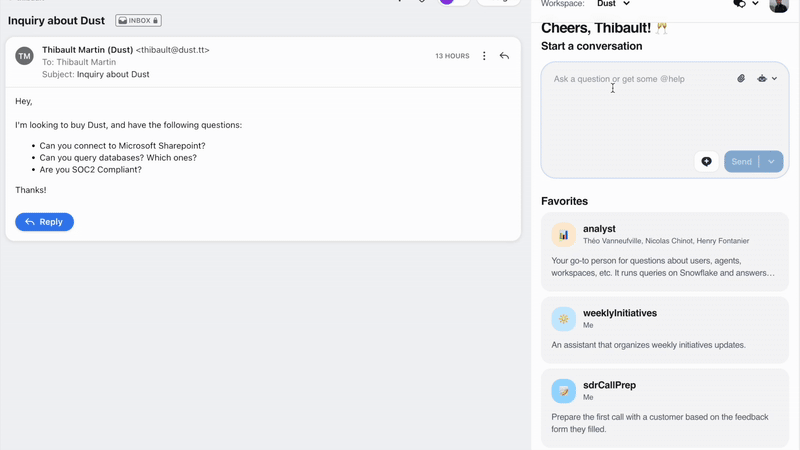How MCP-powered Dust agents will complete tasks for you

Discover the practical implications of the MCP protocol on Dust's capabilities.
Today's businesses use various AI tools across departments - engineering teams code with AI, sales teams engage customers with AI, and support teams manage tickets with AI. However, these tools operate in silos, unable to share information or work together effectively. Tools like Windsurf and Cursor, while powerful for coding, can't access your broader business context or integrate with other systems. While Dust breaks down AI silos by design, the growing adoption of the MCP protocol expands its reach even further.
Enter MCP: breaking down barriers
The Model Context Protocol (MCP) creates a universal language for AI tools to communicate with your business systems. At its core, an MCP server acts as a translator that:
- Exposes available tools and their capabilities
- Enables AI to utilize these tools effectively
For instance, when connected to GitHub, MCP allows AI to understand and execute actions like creating issues or reviewing code.

Two ways Dust + MCP will transform your work
With MCP, Dust will shape two key aspects of your workflows:
1. More actions, less chatting
MCP enables Dust to seamlessly integrate with and leverage a diverse range of third-party tools, performing actions like:
- Writing and sending emails directly in Gmail
- Creating and assigning issues in GitHub
- Scheduling meetings in your calendar
- Updating documents in your knowledge base
No more copying and pasting between tools or switching between windows. Your AI agents can now complete entire workflows from start to finish.

Last, but not least, MCP's strength comes from its open, standardized ecosystem. As more companies embrace these standards, they expand the range of possible actions. This means Dust will gradually have access to a growing range of actions, eliminating the need to build complex, custom applications for each use case.
2. Deeper customization, more context
Dust + MCP extends beyond the current customization we enable with our APIs to offer deeper integration capabilities:
- Build your own custom actions. Create and deploy specialized tools within your codebase that Dust agents can seamlessly access and utilize. This paves the way for more complex automations, leaving your employees time to focus on high value tasks.
- Leverage Dust directly into your products. Integrate Dust's AI capabilities directly into your products through custom connections you manage. This means your applications can leverage Dust's intelligence without leaving your ecosystem, creating a smoother user experience.
- Provide your AI tools with deeper company context. Many AI tools lack essential pieces of context. With MCP, they will be able to tap into your company's knowledge base through Dust. For example, your coding agent in Cursor could access and reference engineering documentation stored in Notion, making it more context-aware and valuable.

Think of it as building custom bridges between Dust and any tool you use. You decide what to connect and how it should work. It's like turning Dust into your company's AI knowledge hub, making every tool smarter.
The path forward
We identify two essential challenges all companies looking into fully leveraging MCP will face:
- First, the explosion of MCP tools demands sophisticated agent management capability. A simple client/agent loop accessing hundreds of tools isn't viable. Success requires specialized agents, each configured for specific tasks with access to company context. Dust provides the infrastructure to build these agents and make them accessible across your technology stack.
- Second, effective enterprise deployment requires granular access control. Blanket MCP server access isn't viable for businesses. Organizations need fine-grained permissions that restrict actions based on roles and teams. Dust serves as the middleware layer managing these permissions between MCP servers and clients. Our AI-native permission system is designed for a world where agents, not just humans, need controlled access to company resources.
Think of a customer support team using an AI agent. The AI agent needs to check different places for information: product docs in Notion, internal guides in Confluence, customer details in Salesforce, and past customer chats in Intercom. The main problem? Many support agents are contractors who shouldn't see all company information. Managing who can see what across these different tools is complicated.
Here's how MCP + Dust helps: you connect all your tools to Dust once and set up detailed access permissions in one place. This lets you control exactly what contractors can and can't see—like allowing access to public docs but not internal data. Without this solution, you'd have to set up permissions separately in each tool and rebuild these security settings every time you create a new AI agent. Dust simplifies everything by managing all configurations, permissions and data access in one central place.
This is why we believe to harness MCP's full potential, organizations need a foundational layer that connects and manages their MCP infrastructure.
This is what we’re building at Dust: the AI Operating System for your Enterprise.
#JustUseDust
Interested in learning more about how Dust can help your team? Visit our website or reach out to our sales team.

